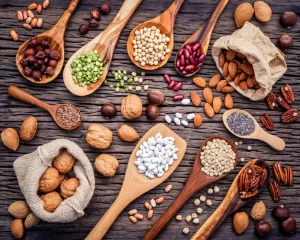 Magnesium is an extremely important mineral for our health, as magnesium deficiency in the body is associated with a wide range of ailments, including muscle pain, nerve changes, dizziness, frequent migraines, and joint diseases.
Magnesium is an extremely important mineral for our health, as magnesium deficiency in the body is associated with a wide range of ailments, including muscle pain, nerve changes, dizziness, frequent migraines, and joint diseases.
There are very few nutrients that have the amazing health benefits that magnesium does. It is the fourth most abundant mineral in the cells of our body, after calcium, phosphorus, and potassium.
Useful properties
- The mineral helps prevent the dystrophy of cartilaginous tissues and the onset of such diseases as osteoarthritis and joint pain.
- Magnesium is a key mineral that treats a variety of muscle ailments.
- Consuming the mineral will help to avoid the following diseases: convulsions, spasms, tingling, numbness, and tremors.
- Regulates the irregular heartbeat.
- Treats high blood pressure.
- Reduces headache and jaw pains that sometimes occur due to overexertion.
- Treats dizziness, which can also be caused by muscle tension in the neck area.
- Improves the ability to adapt to light, and also helps people with low vision in the dark and those who are hypersensitive to noise.
- Provides energy and fights fatigue. It is precisely for this reason that it is recommended to take magnesium during periods of recovery from illnesses and for people who suffer from chronic fatigue, fibromyalgia, or general weakness.
- Overcomes poor appetite for those who have lost it.
- Helps to overcome nausea and vomiting.
- Regulates the risk of constipation, naturally promoting intestinal motility.
- Relieves menstrual cramps.
- Reduces the desire to consume salt and chocolate.
- Regulates the nervous system in such conditions as insomnia, anxiety, hyperactivity, restlessness, panic attacks, and various types of phobias.
- Promotes the formation of collagen, which is of fundamental importance for the skeleton, tendons, and cartilage. If you suffer from a lack of collagen, you should also keep in mind that vitamin C and protein consumption should be combined in one meal.
Foods rich in magnesium
There are many foods that are rich in magnesium, and some may just surprise you. Let’s try to add some of them to each meal.
- Cocoa: pure dark chocolate has almost 500 milligrams of magnesium per 100 grams.
- Dark green plants: chard, lettuce, spinach.
- Fruits: bananas, apricots, avocados, peaches, plums.
- Nuts: almonds, cashews, walnuts.
- Legumes: beans and lentils.
- Seeds.
- Cereals: whole grains of rice, millet, oats.
- Potato.
- Pumpkin.
2 recipes for adding to your diet a daily dose of magnesium
Cocktail:
A very good way to get your daily dose of magnesium is to include it every morning in a shake with the following ingredients: cocoa powder, almond powder, one ripe banana, oatmeal, or rice milk. And if you want your shake a little sweeter, add some honey or brown sugar. Mix well and make this mixture your first meal of the day. The cocktail is suitable for both adults and children.
Salad:
If you want to avoid consuming a significant amount of calories, you need to look for another alternative. For example, you can prepare a salad to eat at every lunch and dinner. This salad consists of raw lettuce or spinach leaves, avocado, tomatoes, walnuts, and lentil sprouts. Season the salad with olive oil and lemon juice, and if desired, add a little sea or Himalayan salt.
Picture Credit: VistaCreate
